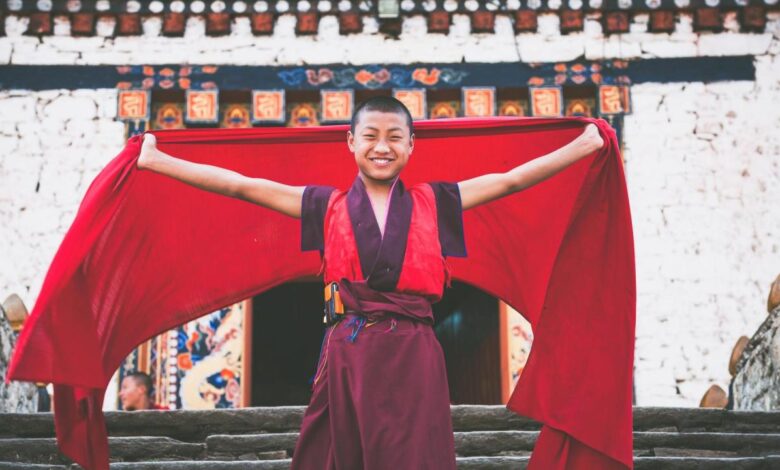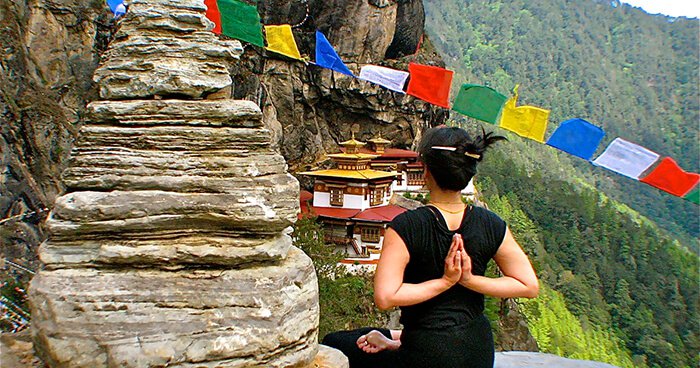
A Quest for Bhutanese Happiness
A quest for the secret to happiness in Bhutan delves into the fascinating philosophy and practices of this unique Himalayan nation. Bhutan’s pursuit of Gross National Happiness (GNH) stands in stark contrast to the predominantly economic-focused models of the West. This exploration will unravel the core tenets of Bhutanese well-being, examining their cultural roots, societal structures, and modern adaptations.
From the ancient wisdom of their culture to the innovative GNH index, Bhutan’s approach to happiness offers valuable insights for individuals and societies grappling with the complexities of modern life. We’ll explore how Bhutanese values, community bonds, and environmental consciousness intertwine to create a thriving, harmonious society. This journey promises to be enlightening and inspiring.
Bhutanese Culture and Philosophy
My quest for the secret to happiness in Bhutan has led me to delve deeper into the unique philosophy that underpins this small Himalayan kingdom. Bhutan’s approach to well-being isn’t simply about material wealth; it’s a holistic system deeply intertwined with its culture and history. This exploration reveals a profound perspective on happiness that offers valuable insights into how we can cultivate a more fulfilling life.Bhutan’s concept of Gross National Happiness (GNH) stands in stark contrast to the predominantly materialistic pursuit of wealth and progress in many Western societies.
This holistic philosophy emphasizes the interconnectedness of individual well-being with the well-being of the community and the environment. It’s a philosophy rooted in Buddhist principles and centuries of cultural traditions.
Core Tenets of Bhutanese Philosophy Regarding Happiness
Bhutan’s philosophy of Gross National Happiness (GNH) is a multifaceted concept encompassing sustainable development, environmental conservation, and the promotion of good governance. The GNH framework emphasizes the importance of psychological well-being, good governance, cultural preservation, and environmental conservation as vital components of a fulfilling life. It goes beyond material wealth and focuses on cultivating a sense of collective well-being.
Historical and Cultural Factors Shaping Bhutan’s Unique Approach
Bhutan’s unique approach to happiness is deeply intertwined with its history and culture. Isolated geographically for centuries, Bhutan developed a distinct cultural identity, emphasizing harmony with nature and community well-being. Buddhism, introduced centuries ago, profoundly shaped the nation’s values, promoting compassion, mindfulness, and ethical conduct as crucial elements of a meaningful life. This isolation allowed for the development of a self-reliant and resilient society, focusing on inner peace and community cohesion.
My recent exploration into Bhutan, searching for the secret to happiness, got me thinking about personal growth. It’s fascinating how a focus on well-being, like Bhutan’s approach, aligns with the dedication shown by the dozens of graduates honored at a transformational leadership ceremony, dozens of graduates honored at transformational leadership ceremony. Perhaps the key to happiness isn’t just a destination, but a journey of continuous learning and leadership, much like these inspiring individuals.
The quest for inner peace in Bhutan continues to resonate with me.
Comparison of Bhutanese and Western Philosophies on Happiness
Bhutan’s approach to happiness diverges significantly from many Western philosophies. While Western philosophies often prioritize individual achievement and material success, Bhutan’s GNH places emphasis on collective well-being, environmental sustainability, and cultural preservation. Western cultures often view happiness as a personal and individual pursuit, while Bhutan’s perspective acknowledges the integral role of community and social harmony.
Traditional Bhutanese Practices Promoting Well-being
Bhutanese traditions offer a rich tapestry of practices aimed at fostering well-being. These include:
- Meditation and Mindfulness: Deeply rooted in Buddhist teachings, meditation practices promote inner peace and focus on the present moment, cultivating emotional regulation and mental clarity.
- Community Festivals and Celebrations: These vibrant cultural events strengthen social bonds, foster a sense of belonging, and reinforce shared values and traditions.
- Respect for Nature: Bhutan’s reverence for nature is reflected in its commitment to environmental conservation, recognizing the vital role of the natural world in human well-being.
- Emphasis on Education and Knowledge: Bhutan’s commitment to education equips its citizens with the knowledge and skills to contribute to the collective good.
The shared experiences and communal celebrations strengthen the social fabric, contributing to a stronger sense of belonging and shared purpose.
Role of Community and Social Connections in Bhutanese Understanding of Happiness
The Bhutanese understanding of happiness is intrinsically linked to strong community ties and social connections. The emphasis on collective well-being fosters a sense of shared responsibility and interdependence. Strong social networks provide support, reduce isolation, and encourage a sense of belonging, vital elements in achieving a fulfilling life.
Key Differences Between Bhutanese and Western Perspectives on Happiness
| Aspect | Bhutanese Perspective | Western Perspective |
|---|---|---|
| Focus | Collective well-being, environmental sustainability, and cultural preservation | Individual achievement, material success, and personal fulfillment |
| Happiness Source | Inner peace, community harmony, and environmental balance | External achievements, possessions, and personal gratification |
| Role of Community | Central to happiness, fostering interdependence and social support | Potentially supportive, but not always prioritized in the pursuit of happiness |
| Relationship with Nature | Integral to well-being, demanding respect and conservation | Often viewed as a resource to be exploited for personal gain |
The Gross National Happiness Index (GNH)
Bhutan’s pursuit of Gross National Happiness (GNH) sets it apart from nations primarily focused on Gross Domestic Product (GDP). This unique philosophy recognizes that true progress extends beyond economic metrics, encompassing social, cultural, and environmental well-being. The GNH framework provides a comprehensive lens through which to evaluate a nation’s development, emphasizing the interconnectedness of these factors.The GNH framework, unlike GDP, strives to measure the overall well-being of citizens and their quality of life.
It considers factors like good governance, education, health, and environmental sustainability, in addition to economic prosperity. This holistic approach is a crucial aspect of Bhutan’s unique path to development.
Components of the GNH
The GNH is not a single measure but a complex framework encompassing several interconnected components. These components are organized hierarchically, reflecting their importance and interrelation. Understanding this hierarchy provides a deeper insight into Bhutan’s approach to development.
- Sustainable and Equitable Socio-Economic Development: This pillar focuses on ensuring equitable access to resources and opportunities for all citizens. It includes factors like poverty reduction, job creation, and fair income distribution.
- Environmental Conservation: Bhutan’s commitment to environmental protection is deeply rooted in its cultural values. The preservation of its natural beauty and biodiversity is seen as essential for the well-being of both people and the planet.
- Good Governance: A strong and transparent government is vital for upholding the values of GNH. This includes upholding democratic principles, ensuring citizen participation, and promoting accountability.
- Culture and Heritage Preservation: Bhutan’s unique cultural identity is an integral part of its national identity. This pillar emphasizes protecting and promoting traditional arts, music, and customs, thereby enriching the lives of citizens.
- Health: This component recognizes that a healthy population is a prerequisite for a flourishing society. It includes access to quality healthcare, promotion of healthy lifestyles, and a focus on mental well-being.
- Education: A well-educated population is essential for economic progress and personal fulfillment. This includes providing quality education at all levels, promoting lifelong learning, and fostering critical thinking skills.
Metrics Used to Measure GNH
Measuring GNH is a complex task, different from simply tracking GDP. Bhutan employs various metrics to assess progress across its components. These methods provide a more nuanced picture of the country’s development, going beyond the traditional economic indicators.
- Surveys: Regular surveys are conducted to gather citizen feedback on their well-being across different aspects of life, including their perceptions of happiness, health, and satisfaction with various aspects of governance. This provides valuable insights into the lived experiences of citizens.
- Indicators: A range of indicators, including economic indicators, health indicators, and environmental indicators, are used to track progress. These are analyzed alongside the survey data to provide a comprehensive view of the nation’s progress towards GNH.
- Focus Groups: These are used to gather more in-depth information from specific groups within society. This provides more context-specific insights into various aspects of citizen life.
Strengths and Limitations of GNH Metrics
The GNH metrics offer a more holistic perspective on development compared to GDP. However, they also have limitations.
My quest for the secret to happiness in Bhutan has taken an unexpected turn. While exploring the serene landscapes, news of the Air Jamaica CEO resignation and the subsequent protests caught my attention. This event, detailed in this article about air jamaica ceo resignation prompts protest , reminds me that even in tranquil places, the world’s complexities still reach us.
Perhaps, the true secret to happiness isn’t just in the mountains but also in understanding the interconnectedness of our global community.
- Subjectivity: Some aspects of GNH, like happiness, are subjective and difficult to quantify. This poses a challenge in creating consistent and reliable measures.
- Data Collection Challenges: Collecting data across diverse populations and social strata can be challenging. Ensuring data accuracy and representativeness is crucial for meaningful results.
- Complexity: The complexity of the GNH framework makes it challenging to identify clear cause-and-effect relationships between various factors and overall well-being.
Hierarchical Structure of GNH Components
<ul>
<li>Sustainable and Equitable Socio-Economic Development
<ul>
<li>Poverty Reduction</li>
<li>Job Creation</li>
<li>Fair Income Distribution</li>
</ul>
</li>
<li>Environmental Conservation
<ul>
<li>Biodiversity Protection</li>
<li>Sustainable Resource Management</li>
</ul>
</li>
<li>Good Governance
<ul>
<li>Democratic Principles</li>
<li>Citizen Participation</li>
</ul>
</li>
<li>Culture and Heritage Preservation
<ul>
<li>Traditional Arts</li>
<li>Cultural Identity</li>
</ul>
</li>
<li>Health
<ul>
<li>Access to Healthcare</li>
<li>Promotion of Healthy Lifestyles</li>
</ul>
</li>
<li>Education
<ul>
<li>Quality Education</li>
<li>Lifelong Learning</li>
</ul>
</li>
</ul>
Impact on Bhutan’s Development Priorities
The GNH framework directly influences Bhutan’s development priorities. Projects are assessed not just on economic output but also on their social and environmental impact. This holistic approach is a core element of Bhutan’s unique development strategy.
Comparison of GNH and GDP
| Indicator | Gross National Happiness (GNH) | Gross Domestic Product (GDP) |
|---|---|---|
| Focus | Overall well-being of citizens, including social, cultural, and environmental factors | Market value of all final goods and services produced within a country in a given period |
| Metrics | Surveys, indicators, focus groups, and other qualitative data | Monetary value of goods and services |
| Strengths | Holistic view of progress, considers social and environmental factors | Provides a measure of economic activity and growth |
| Limitations | Subjectivity in some measures, challenges in data collection | Doesn’t account for social or environmental well-being |
The Search for Happiness in a Modern Context
Bhutan’s pursuit of Gross National Happiness (GNH) presents a fascinating case study in navigating the complexities of modernization while upholding traditional values. This journey isn’t without its challenges, but the resilience and adaptability of the Bhutanese people offer valuable insights for societies worldwide seeking to balance progress with well-being. The interplay of technology, globalization, and traditional Bhutanese philosophy is shaping the nation’s future in profound ways.
The pursuit of happiness in modern Bhutan involves navigating a delicate balance between preserving cultural heritage and embracing the opportunities presented by the 21st century. This balance is reflected in the nation’s approach to sustainable development and its efforts to integrate traditional wisdom with contemporary advancements. The challenges and opportunities are significant, but the Bhutanese demonstrate a remarkable ability to adapt and maintain their unique identity.
Challenges and Opportunities in Modern Bhutan
Bhutan faces the typical challenges of modernization, such as economic disparities and the potential erosion of traditional values. However, the nation also possesses unique advantages, including a strong sense of national unity and a deep commitment to environmental protection. These factors present opportunities for building a sustainable and prosperous future. The interplay between these challenges and opportunities dictates the path Bhutan chooses to take in its quest for GNH.
Role of Technology and Globalization
Globalization and technological advancements have significantly impacted Bhutanese society. Access to information and communication technologies is rapidly expanding, influencing cultural norms and values. The internet and social media have facilitated connections with the outside world, introducing new ideas and perspectives. However, the potential for cultural homogenization and the need for critical engagement with external influences are important considerations.
My quest for the secret to happiness in Bhutan is leading me down some interesting avenues. While exploring the country’s unique approach to well-being, I stumbled upon news that American Cruise Lines launched a new agent portal, american cruise lines launches agent portal , which could offer incredible opportunities for those seeking similar journeys. It’s fascinating how different travel sectors are evolving, yet the pursuit of happiness in places like Bhutan remains timeless.
The nation’s strategy to leverage technology while preserving its unique cultural identity is crucial for maintaining GNH.
Conflicts Between Traditional Values and Modern Lifestyles
Traditional Bhutanese values often emphasize community, harmony with nature, and spiritual well-being. Modern lifestyles, particularly in urban areas, can prioritize individual achievement and material possessions. This creates a potential tension between traditional values and the pressures of a globalized world. Bhutan’s ability to integrate these seemingly contrasting aspects into a cohesive national identity is a significant factor in its pursuit of GNH.
Strategies to foster a sense of community and promote environmental awareness in modern Bhutanese society are essential.
Adaptation to Modern Challenges
Bhutanese people demonstrate remarkable adaptability in the face of modern challenges. Their ability to maintain their cultural identity while embracing technological advancements is a testament to their resilience. This adaptability is reflected in various aspects of Bhutanese life, from agriculture to education. The nation’s strong emphasis on education and cultural preservation plays a critical role in navigating this transition.
Importance of Sustainable Development
Bhutan’s commitment to sustainable development is deeply intertwined with its pursuit of GNH. Recognizing the intrinsic link between environmental protection and societal well-being, the nation prioritizes ecological conservation and responsible resource management. Sustainable development is not merely an environmental goal; it is a cornerstone of Bhutan’s national philosophy. Sustainable practices in agriculture, tourism, and energy production are integral to achieving a balance between progress and preservation.
Examples of Bhutanese Adaptation to Modernization
| Aspect of Modernization | Adaptation Strategy | Example |
|---|---|---|
| Tourism | Balancing economic benefits with environmental preservation | Strict regulations on eco-tourism, promoting responsible travel practices |
| Education | Integrating traditional values with modern knowledge | Curriculum emphasizing cultural heritage alongside scientific and technological advancements |
| Agriculture | Sustainable farming practices to protect biodiversity and ecosystems | Promoting organic farming techniques, reducing reliance on chemical fertilizers |
The Quest for Sustainable Happiness

Bhutan’s unique approach to development, focusing on Gross National Happiness (GNH), highlights the interconnectedness of well-being and environmental sustainability. This holistic view recognizes that true happiness stems not only from individual prosperity but also from a healthy environment and a vibrant cultural heritage. This pursuit necessitates a commitment to responsible environmental stewardship and cultural preservation.
Bhutan’s journey towards sustainable happiness is a testament to the profound impact that environmental harmony can have on the overall quality of life. The country’s policies reflect a deep understanding of this connection, ensuring that economic growth is balanced with ecological preservation. This delicate balance is fundamental to the continued pursuit of GNH.
Environmental Sustainability and Happiness in Bhutan
Bhutan’s commitment to environmental sustainability is deeply intertwined with its pursuit of GNH. The country recognizes that a healthy environment is essential for the long-term well-being of its citizens. The preservation of biodiversity, pristine landscapes, and ecological balance are not merely environmental goals, but integral components of a happy society. This understanding informs Bhutan’s policies and initiatives.
Specific Environmental Policies and Initiatives
Bhutan has implemented several groundbreaking environmental policies and initiatives. These are designed to safeguard its unique ecosystems and ensure the long-term health of the nation. Bhutan’s constitution enshrines environmental protection as a fundamental principle. This commitment is further reinforced by a series of national policies and strategies.
- Bhutan’s ambitious goal of achieving 100% renewable energy by 2030 underscores its commitment to sustainable energy sources. This initiative aims to reduce reliance on fossil fuels and mitigate the effects of climate change. It exemplifies a proactive approach to environmental stewardship.
- Strict forest conservation policies are in place to protect Bhutan’s vast and diverse forests. These policies are aimed at maintaining the ecological balance and preventing deforestation. This approach demonstrates a deep understanding of the crucial role forests play in maintaining clean air, water, and biodiversity.
- Sustainable agriculture practices are promoted to ensure food security while minimizing environmental impact. These initiatives are crucial for safeguarding the nation’s agricultural resources and maintaining ecological balance.
Ecological Balance for GNH
Ecological balance plays a pivotal role in Bhutan’s pursuit of GNH. A healthy ecosystem contributes to a multitude of aspects of well-being, from clean air and water to biodiversity and resilience to climate change. The preservation of natural resources is essential for the long-term sustainability of the nation. Maintaining a healthy ecological balance ensures the availability of natural resources for future generations.
Environmental Protection and Well-being
Environmental protection directly enhances the well-being of Bhutanese citizens. Clean air and water are essential for good health. The preservation of biodiversity supports diverse livelihoods and cultural practices. Protected areas provide opportunities for recreation and tourism, generating economic benefits while promoting environmental awareness.
- Clean air and water sources directly contribute to improved public health outcomes. The absence of significant pollution contributes to a healthier population and, in turn, a happier society.
- Protected areas, like national parks and reserves, attract tourists, boosting the economy and creating jobs, while simultaneously preserving natural beauty.
- The preservation of biodiversity allows for the continued development of traditional medicinal practices and a deeper understanding of the natural world, enriching cultural heritage.
Preserving Cultural Heritage for Happiness
Bhutan’s rich cultural heritage is inextricably linked to its pursuit of GNH. Cultural preservation is vital for the happiness and well-being of its citizens. The transmission of traditional values, arts, and knowledge strengthens social cohesion and provides a sense of identity and belonging. These practices are crucial for maintaining cultural diversity.
- The preservation of traditional arts and crafts sustains livelihoods and promotes cultural expression, contributing to a sense of pride and community.
- The safeguarding of indigenous knowledge and traditional practices reinforces cultural identity and strengthens social cohesion.
- The promotion of cultural tourism can provide economic benefits while preserving cultural heritage and promoting intercultural understanding.
Bhutan’s Environmental Initiatives and their Impact on Happiness
| Environmental Initiative | Impact on Happiness |
|---|---|
| Sustainable Energy Transition | Reduced reliance on fossil fuels, cleaner air and water, contributing to improved public health |
| Forest Conservation | Preservation of biodiversity, maintenance of clean air and water sources, support for livelihoods dependent on forests |
| Sustainable Agriculture | Food security, protection of agricultural land and resources, contributing to overall well-being |
| Protected Areas Management | Opportunities for recreation, tourism, and education, contributing to economic development and a sense of place |
Exploring the Path to Happiness
Bhutan’s pursuit of Gross National Happiness (GNH) offers a compelling framework for understanding the multifaceted nature of well-being. Moving beyond economic indicators, GNH considers the social, cultural, and environmental factors that contribute to a fulfilling life. This exploration delves into the key elements of Bhutanese society that foster happiness, highlighting the role of education, ethical conduct, and personal development in achieving a sustainable and meaningful existence.
My quest for the secret to happiness in Bhutan is taking a fascinating turn. I’m intrigued by the focus on adventure now being offered by cruise lines like the American Queen Ocean Victory, which is winning points for its adventure-focused itineraries. This innovative approach might just offer the perfect blend of tranquility and exploration, mirroring the serene yet vibrant spirit of Bhutan.
Hopefully, these new adventure cruise options can provide some valuable insights into the pursuit of happiness. This is an interesting connection to the heart of the Bhutanese quest.
Bhutan’s unique approach to happiness emphasizes a holistic perspective, recognizing that true well-being encompasses more than just material prosperity. This model encourages individuals to cultivate inner peace and contentment alongside external success, offering valuable insights for navigating the complexities of modern life.
Key Elements Contributing to Happiness in Bhutanese Society
Bhutanese society fosters happiness through a deep-rooted connection to nature, a strong emphasis on community, and a profound respect for tradition. The strong emphasis on community spirit and shared responsibility promotes a sense of belonging and interconnectedness, crucial for individual well-being. Furthermore, the preservation of cultural heritage and traditional values provides a sense of stability and purpose, shaping individuals’ understanding of their place in the world.
Role of Education and Personal Development in Achieving Happiness
Education in Bhutan is not solely focused on academic achievement but also emphasizes moral and ethical development. The curriculum often integrates traditional Bhutanese values and philosophies, fostering critical thinking and self-awareness. Furthermore, personal development programs, often incorporating meditation and mindfulness practices, encourage individuals to cultivate inner peace and emotional resilience. This holistic approach equips individuals with the tools to navigate life’s challenges with grace and find contentment in their experiences.
Significance of Ethical Conduct in Bhutanese Culture, A quest for the secret to happiness in bhutan
Ethical conduct is central to Bhutanese culture, underpinning social harmony and individual well-being. The concept of “lies” is considered a transgression, and integrity is valued highly. This emphasis on ethical principles extends beyond personal conduct to encompass community interactions and environmental stewardship. The Bhutanese belief in the interconnectedness of all things fosters a sense of responsibility towards others and the environment.
Personal Development Plan for Pursuing Happiness
| Phase | Focus | Activities |
|---|---|---|
| Self-Awareness | Understanding personal values, strengths, and weaknesses | Journaling, mindfulness exercises, reflection on past experiences, identifying personal values, exploring strengths and weaknesses |
| Skill Development | Cultivating skills in communication, emotional intelligence, and problem-solving | Taking courses in communication, emotional intelligence, problem-solving, and conflict resolution; practicing active listening, empathy, and constructive feedback |
| Mindfulness and Wellbeing | Practicing mindfulness and developing healthy coping mechanisms | Meditation, yoga, spending time in nature, cultivating gratitude, practicing self-compassion |
| Community Engagement | Building strong relationships and contributing to the community | Volunteering, participating in community events, nurturing relationships with family and friends, supporting local businesses |
Examples of Adopting Bhutanese Values for a Fulfilling Life
Individuals can adopt Bhutanese values by practicing gratitude for the present moment, fostering strong relationships, and engaging in meaningful work. Connecting with nature, preserving cultural heritage, and respecting traditional values can also contribute to a fulfilling life. Moreover, prioritizing ethical conduct in all aspects of life and nurturing compassion for others are key elements to integrating Bhutanese values into a modern lifestyle.
“Happiness is not about material possessions, but about inner peace and contentment.”
– A Bhutanese farmer
“Our connection to nature is deeply ingrained in our understanding of happiness.”
-A Bhutanese teacher
“Ethical conduct is the foundation of a harmonious society.”
-A Bhutanese elder
Illustrative Examples of Bhutanese Happiness

Bhutan’s unique approach to Gross National Happiness (GNH) offers a compelling lens through which to understand well-being. It’s not simply about material wealth but a holistic perspective encompassing mental, social, and environmental factors. This approach prioritizes the collective good, fostering harmony and contentment within society. This section delves into real-life examples illustrating the principles of Bhutanese happiness.
Bhutanese society emphasizes a deep connection to nature, cultural traditions, and strong community bonds. These elements create a rich tapestry of experiences contributing to a sense of purpose and fulfillment. The pursuit of happiness in Bhutan transcends material gain, focusing on a balance between personal well-being and societal harmony.
A Bhutanese Family’s Experience
Bhutanese families often find happiness in simple pleasures. The family dynamic typically revolves around close-knit relationships. A common scenario involves a family enjoying a meal together, perhaps with freshly harvested vegetables from their own garden. This shared experience, often accompanied by conversation and laughter, reinforces family bonds. They might participate in communal activities like a local festival, sharing stories and traditions with neighbours.
The emphasis on communal well-being and the close-knit nature of Bhutanese families often contributes to their collective happiness.
Cultural Practices Contributing to Well-being
Several cultural practices contribute significantly to the well-being of Bhutanese individuals and families. The deep respect for elders and the emphasis on filial piety fosters a sense of responsibility and interdependence. Traditional Bhutanese music and dance, often performed at community gatherings, provide opportunities for cultural expression and social interaction, creating a sense of shared identity and joy. Furthermore, the practice of “dzongkhag” (administrative divisions) fosters local governance, ensuring the well-being of communities through participatory decision-making processes.
A Journey Towards Happiness
A Bhutanese individual named Tshering, growing up in a rural village, found contentment in his community’s close-knit nature. He valued his role in the farming community, the annual festivals, and the shared meals with neighbours. His path wasn’t defined by material possessions, but by his involvement in the local community. Tshering’s journey illustrates the deep-rooted Bhutanese belief that true happiness stems from a balanced life focused on spiritual and social connections, rather than solely material pursuits.
The Importance of Community
The importance of community is paramount in Bhutanese culture.
Imagine a vibrant Bhutanese village nestled in the Himalayas.
A young woman named Pema, eager to learn a traditional craft, finds a supportive community of fellow artisans. They share knowledge, celebrate each other’s achievements, and offer encouragement during challenges. The shared experience strengthens their bonds and fosters a sense of belonging.
My quest for the secret to happiness in Bhutan has been fascinating, but sometimes, even the most peaceful journeys can have unexpected turns. For example, learning about after 8 years veitch departs ncl has made me think about how change and transitions, even in seemingly idyllic settings, can influence the very pursuit of happiness. Ultimately, though, my journey to uncover Bhutan’s secrets to contentment continues.
This sense of community transcends individual needs, focusing on the collective well-being of the village. The mutual support and collaboration create a profound sense of belonging and happiness.
Bhutanese Perspectives and Personal Well-being
Bhutanese perspectives on happiness can inform a personal journey toward well-being. Focusing on close relationships, meaningful work, and engagement in community activities can lead to a greater sense of purpose and fulfillment. A shift in focus from material acquisition to the cultivation of strong social connections can yield profound personal contentment.
Imagery of Bhutan and its People
Bhutanese landscapes are often depicted with majestic mountains, lush valleys, and pristine rivers. These images symbolize the country’s natural beauty, emphasizing the importance of environmental conservation. The vibrant attire of Bhutanese people, reflecting their cultural heritage, adds to the visual appeal, symbolizing the rich diversity and cultural richness. The images portray the harmony between nature and humanity, illustrating a deep respect for both.
Smiling faces of Bhutanese individuals, often in traditional dress, capture the warmth and friendliness of the people. These images showcase a holistic approach to happiness, emphasizing the connection to nature, culture, and community.
Summary: A Quest For The Secret To Happiness In Bhutan
In conclusion, a quest for the secret to happiness in Bhutan reveals a profound and holistic approach to well-being. By understanding Bhutan’s cultural philosophy, the GNH index, and the challenges of modernization, we gain a richer perspective on the multifaceted nature of happiness. Bhutan’s example suggests that true happiness might lie not just in individual pursuits, but also in collective well-being, environmental stewardship, and a deep connection to cultural heritage.
Perhaps, there are lessons to be learned for everyone.
General Inquiries
What are some common misconceptions about Bhutanese happiness?
Some people mistakenly believe that Bhutanese happiness is simply a matter of avoiding stress. While minimizing unnecessary stress is important, Bhutan’s philosophy encompasses a broader concept of well-being, including environmental sustainability, social harmony, and a rich cultural heritage.
How does the GNH differ from GDP as a measure of national progress?
The Gross National Happiness Index (GNH) emphasizes factors like good governance, environmental conservation, and community well-being, while GDP primarily focuses on economic output. Bhutan recognizes that a nation’s true progress extends beyond purely economic metrics.
What are some specific examples of how Bhutanese people adapt to modern challenges while maintaining their values?
Bhutanese individuals balance modernization with tradition by integrating technology and global influences into their lives while upholding their cultural values, like strong family ties and community involvement. They strive to find a harmonious coexistence between their heritage and contemporary realities.
What role does education play in achieving happiness in Bhutanese society?
Education is crucial in Bhutan for fostering individual development and contributing to a happier society. It emphasizes not only academic knowledge but also ethical conduct, promoting responsible citizenship and personal growth within the context of Bhutanese values.





